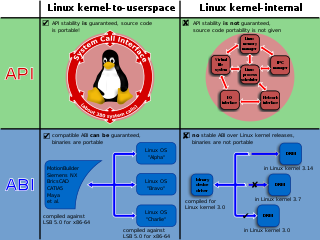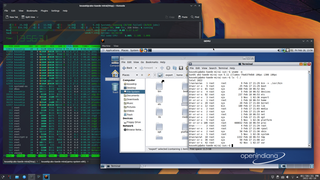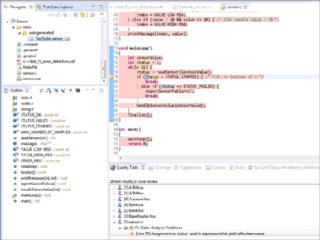Related Research Articles

The GNU Debugger (GDB) is a portable debugger that runs on many Unix-like systems and works for many programming languages, including Ada, Assembly, C, C++, D, Fortran, Haskell, Go, Objective-C, OpenCL C, Modula-2, Pascal, Rust, and partially others.
In computer science, static program analysis is the analysis of computer programs performed without executing them, in contrast with dynamic program analysis, which is performed on programs during their execution in the integrated environment.

In computer software, an application binary interface (ABI) is an interface between two binary program modules. Often, one of these modules is a library or operating system facility, and the other is a program that is being run by a user.
ARM is a family of RISC instruction set architectures (ISAs) for computer processors. Arm Holdings develops the ISAs and licenses them to other companies, who build the physical devices that use the instruction set. It also designs and licenses cores that implement these ISAs.
In computing, cross-platform software is computer software that is designed to work in several computing platforms. Some cross-platform software requires a separate build for each platform, but some can be directly run on any platform without special preparation, being written in an interpreted language or compiled to portable bytecode for which the interpreters or run-time packages are common or standard components of all supported platforms.
In computing, binary translation is a form of binary recompilation where sequences of instructions are translated from a source instruction set to the target instruction set. In some cases such as instruction set simulation, the target instruction set may be the same as the source instruction set, providing testing and debugging features such as instruction trace, conditional breakpoints and hot spot detection.
A cross compiler is a compiler capable of creating executable code for a platform other than the one on which the compiler is running. For example, a compiler that runs on a PC but generates code that runs on Android devices is a cross compiler.

Valgrind is a programming tool for memory debugging, memory leak detection, and profiling.

C99 is a past version of the C programming language open standard. It extends the previous version (C90) with new features for the language and the standard library, and helps implementations make better use of available computer hardware, such as IEEE 754-1985 floating-point arithmetic, and compiler technology. The C11 version of the C programming language standard, published in 2011, updates C99.

Free Pascal Compiler (FPC) is a compiler for the closely related programming-language dialects Pascal and Object Pascal. It is free software released under the GNU General Public License, with exception clauses that allow static linking against its runtime libraries and packages for any purpose in combination with any other software license.
In the context of software engineering, software quality refers to two related but distinct notions:

QEMU is a free and open-source emulator that uses dynamic binary translation to emulate the processor of a computer. It provides a variety of hardware and device models for the virtual machine, enabling it to run different guest operating systems. QEMU can be used in conjunction with a Kernel-based Virtual Machine (KVM) to emulate hardware at near-native speeds. Additionally, it supports user-level processes, allowing applications compiled for one processor architecture to run on another.

A free and open-source graphics device driver is a software stack which controls computer-graphics hardware and supports graphics-rendering application programming interfaces (APIs) and is released under a free and open-source software license. Graphics device drivers are written for specific hardware to work within a specific operating system kernel and to support a range of APIs used by applications to access the graphics hardware. They may also control output to the display if the display driver is part of the graphics hardware. Most free and open-source graphics device drivers are developed by the Mesa project. The driver is made up of a compiler, a rendering API, and software which manages access to the graphics hardware.
In C and related programming languages, long double refers to a floating-point data type that is often more precise than double precision though the language standard only requires it to be at least as precise as double. As with C's other floating-point types, it may not necessarily map to an IEEE format.
In the context of free and open-source software, proprietary software only available as a binary executable is referred to as a blob or binary blob. The term usually refers to a device driver module loaded into the kernel of an open-source operating system, and is sometimes also applied to code running outside the kernel, such as system firmware images, microcode updates, or userland programs. The term blob was first used in database management systems to describe a collection of binary data stored as a single entity.
GrammaTech is a cybersecurity research services company based in Ithaca, New York. The company was founded in 1988 as a technology spin-off of Cornell University. GrammaTech software research services include the following; software analysis, vulnerability detection and mitigation, binary transformation and hardening, and autonomous computing. In September 2023, Battery Ventures acquired GrammaTech's software products division, including the CodeSonar and CodeSentry product lines. Thus establishing a new, independent entity that will operate under the CodeSecure, Inc. name and be headquartered in Bethesda, Maryland.
Bionic is an implementation of the C standard library, developed by Google for its Android operating system. It differs from the GNU C Library (glibc) in being designed for devices with less memory and processor power than a typical Linux system. It is a combination of new code and code from FreeBSD, NetBSD, and OpenBSD released under a BSD license, rather than glibc, which uses the GNU Lesser General Public License. This difference was important in the early days of Android, when static linking was common, and since Bionic has its own application binary interface, it cannot be replaced by a different libc without breaking all existing apps.

Parasoft C/C++test is an integrated set of tools for testing C and C++ source code that software developers use to analyze, test, find defects, and measure the quality and security of their applications. It supports software development practices that are part of development testing, including static code analysis, dynamic code analysis, unit test case generation and execution, code coverage analysis, regression testing, runtime error detection, requirements traceability, and code review. It's a commercial tool that supports operation on Linux, Windows, and Solaris platforms as well as support for on-target embedded testing and cross compilers.
The Power of 10 Rules were created in 2006 by Gerard J. Holzmann of the NASA/JPL Laboratory for Reliable Software. The rules are intended to eliminate certain C coding practices which make code difficult to review or statically analyze. These rules are a complement to the MISRA C guidelines and have been incorporated into the greater set of JPL coding standards.
AbsInt is a software-development tools vendor based in Saarbrücken, Germany. The company was founded in 1998 as a technology spin-off from the Department of Programming Languages and Compiler Construction of Prof. Reinhard Wilhelm at Saarland University. AbsInt specializes in software-verification tools based on abstract interpretation. Its tools are used worldwide by Fortune 500 companies, educational institutions, government agencies and startups.
References
- ↑ Vitek, D. (2016). "Auditing Code for Security Vulnerabilities with CodeSonar". 2016 IEEE Cybersecurity Development (SecDev). p. 154. doi:10.1109/SecDev.2016.042. ISBN 978-1-5090-5589-0. S2CID 33024752.
- ↑ Balakrishnan, Gogul; Gruian, Radu; Reps, Thomas; Teitelbaum, Tim (2005). "CodeSurfer/X86—A Platform for Analyzing x86 Executables". Compiler Construction. Lecture Notes in Computer Science. Vol. 3443. Springer. pp. 250–254. doi: 10.1007/978-3-540-31985-6_19 . ISBN 978-3-540-31985-6.
- ↑ Gopan, Denis; Driscoll, Evan; Nguyen, Ducson; Naydich, Dimitri; Loginov, Alexey; Melski, David (2015). "Data-delineation in Software Binaries and Its Application to Buffer-overrun Discovery". Proceedings of the 37th International Conference on Software Engineering - Volume 1. ICSE '15. Florence, Italy: IEEE Press: 145–155. ISBN 978-1-4799-1934-5.
- ↑ Lim, J.; Reps, T. (April 2008). "A system for generating static analyzers for machine instructions" (PDF). Proc. Int. Conf. on Compiler Construction. New York: Springer-Verlag.
- ↑ Anderson, P. (2008). Coding standards for high-confidence embedded systems. MILCOM 2008 - IEEE Military Communications Conference. San Diego, CA. pp. 1–7. doi:10.1109/MILCOM.2008.4753206.
- ↑ Quinnell, Richard A. (2008-03-06). "Static analysis stomps on bugs". EETimes. Retrieved 2009-09-11.
- ↑ Jetley, Raoul Praful; Jones, Paul L.; Anderson, Paul (2008). "Static analysis of medical device software using CodeSonar". Proceedings of the 2008 workshop on Static analysis. Tucson, Arizona: ACM. pp. 22–29. doi:10.1145/1394504.1394507. ISBN 978-1-59593-924-1. S2CID 18152934.
- ↑ Koopman, P. (2014-09-18). "A Case Study of Toyota Unintended Acceleration and Software Safety" (PDF). Carnegie Mellon University. Retrieved 2019-09-12.
- ↑ Barr, Michael (2011-03-01). "Unintended Acceleration and Other Embedded Software Bugs". Embedded Gurus. Retrieved 2019-09-11.